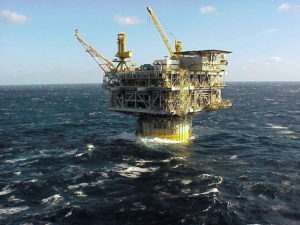by WorldTribune Staff, December 21, 2016
In a final effort to counter President-elect Donald Trump’s plans to expand energy extraction, President Barack Obama on Dec. 20 announced a permanent ban on offshore drilling in broad parts of the Arctic and Atlantic coasts.
The ban relies on the Outer Continental Shelf Lands Act of 1953, which says the president “may, from time to time, withdraw” federal waters from oil and gas development that are not already leased.

Obama’s executive order, which is almost certain to be challenged, appears to be the first time the 1953 law has been used to impose a permanent drilling ban.
A senior administration official said the White House was “quite confident” that the move could not be undone by Trump, noting that the law specifies no provision for reversal. The official suggested that overturning the ban could require years of legal action and the passage of a bill in Congress.
Some oil industry leaders, however, said they believed the Trump administration could easily reverse it. They cited a 2008 memorandum by President George W. Bush that lifted a temporary ban in certain offshore areas imposed by President Bill Clinton.
“Fortunately, there is no such thing as a permanent ban, and we look forward to working with the new administration on fulfilling the will of American voters on energy production,” wrote Erik Milito of the American Petroleum Institute.
Obama’s move was part of a joint action with Canada, where Prime Minister Justin Trudeau also made long-term, though not permanent, commitments to protect the Arctic from drilling.
Obama cited the Arctic’s “unique ecosystem,” the risk of damage from a spill, the high cost of working in the remote and frigid region and concerns about climate change.
“It would take decades to fully develop the production infrastructure necessary for any large-scale oil and gas leasing production in the region – at a time when we need to continue to move decisively away from fossil fuels,” Obama said in a written statement.
Many Alaskans view offshore drilling as a crucial economic lifeline — and lawmakers said Obama’s decision would leave them with even fewer options.
“President Obama has once again treated the Arctic like a snow globe, ignoring the desires of the people who live, work, and raise a family there,” said Sen. Lisa Murkowski, chairwoman of the Senate Committee on Energy and Natural Resources. “I cannot wait to work with the next administration to reverse this decision.”
Trump made clear his intentions for robust new drilling during the campaign.
The president-elect also promised to champion coal power, eliminate subsidies for green energy programs and broadly relax federal environmental regulations. His pick to head the Environmental Protection Agency, Oklahoma Attorney General Scott Pruitt, is a climate change skeptic who has led state efforts to resist the EPA’s authority. Trump’s choice for Energy Secretary, former Texas Gov. Rick Perry, has also expressed doubts about human-caused climate change and is a close ally of the oil industry.
